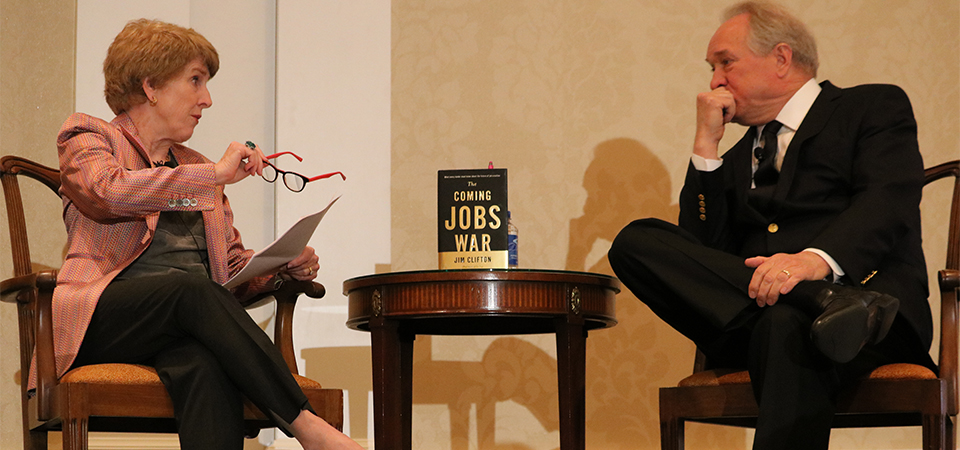The Real Estate Council kicked off our 2018 programs series on January 11 with our first Bank of Texas Speaker Series event of the year, a fascinating one-on-one conversation between Billingsley Company Co-founder Lucy Billingsley and Gallup Chairman and CEO Jim Clifton. Clifton, author of The Coming Jobs War and several works on the economy and business leadership, described a U.S. economy in stark contrast to its regular depiction in the media and from the federal government: He argued that worker productivity and GDP growth has stalled over recent decades, that Americans no longer start businesses at the rate they once did, and that the amount of “good jobs” – full-time positions ranging from $50,000 to $80,000 in annual salary – is lacking despite a low 4.1 percent official unemployment rate.
Of course, Clifton’s talk wasn’t entirely gloomy. He offered hope that “Dallas could be the greatest city in the world,” but it mustn’t look to cities like Washington D.C. for guidance and validation. Here are our three takeaways from Clifton’s Speaker Series appearance:
“Good Jobs” Are Everything
Clifton credited the majority of job gains in recent years to a glut of contract and other short-term positions that he said were insufficient for real, sustainable economic growth. A better economic barometer? The amount of “good jobs” within the economy. In addition to salary guidelines, Clifton said most “good jobs” are created at companies in the startup phase. Despite Silicon Valley’s trendy place in American culture and the world over, Clifton said that Americans don’t start enough companies each year to create the amount of “good jobs” necessary for long-term economic growth. To turn things around, he suggested firms make a commitment to nurturing entrepreneurship in younger generations.
Workplace Priorities Have Changed
As a young professional, Clifton said his idea of the American Dream was simple: to meet a woman with whom he’d start a family and have a job and home needed to support that family. But decades later, the Millennials that Gallup polls and he encounters are more apt to prioritize their careers and often put off starting families until later in life. Instead, today’s American Dream is a meaningful position at an organization with purpose, opportunities for growth and development, and a manager or colleagues that care. How well an organization can provide those opportunities will determine how well it is able to attract and retain talent.
Look to Your Tribal Leaders
It’s easy to turn on the news and worry about the biggest headlines coming out of Washington, but Clifton argued that the federal government’s actions don’t affect our cities and communities on a day-to-day basis all that much. Success and sustainability ultimately fall upon our tribal leaders, people who Clifton describes in The Coming Jobs War as “loyal, highly successful” community leaders who “care about the success of the whole community and all the people more than anything else in the world.” Though not elected, they’re also the people who have the kinds of relationships that, Clifton writes, “can accomplish things that no one else can. And they get them done better and faster than the city council can.” Tribal leaders live in every city but those most forward-thinking, creative and committed will determine which cities thrive and which fall to the wayside. Luckily for Dallas and for TREC, we have many tribal leaders amongst our members. From our Foundation and Community Fund project leaders to TREC’s Shark Tank investors to the consortium of nonprofits constructing the Dallas Catalyst Project, a city’s success ultimately depends on how well these tribal leaders are able to build the city they’ve imagined.
